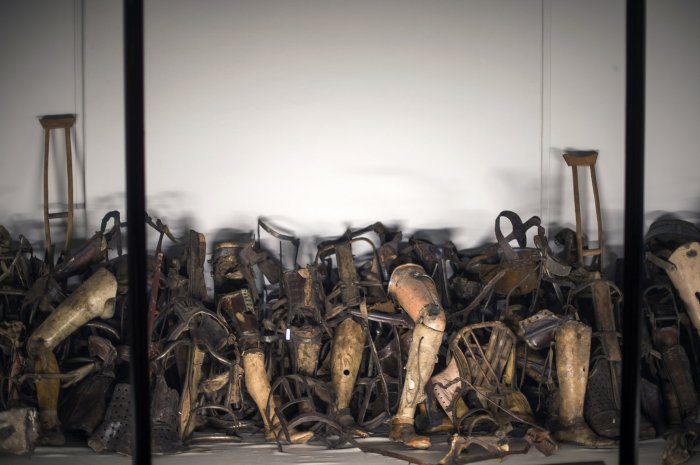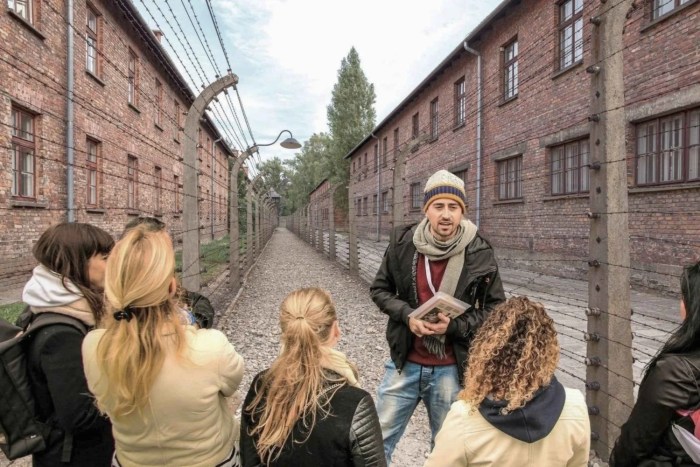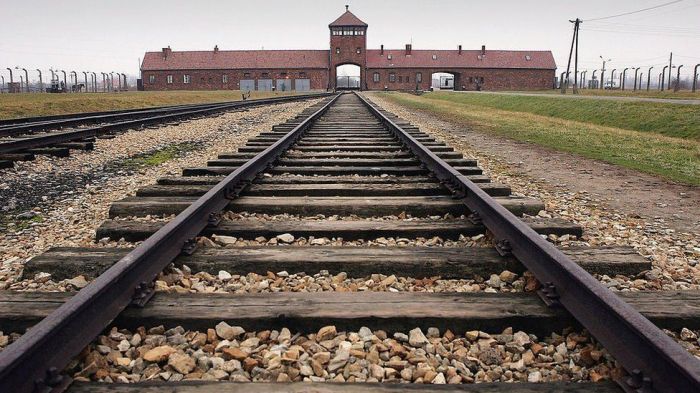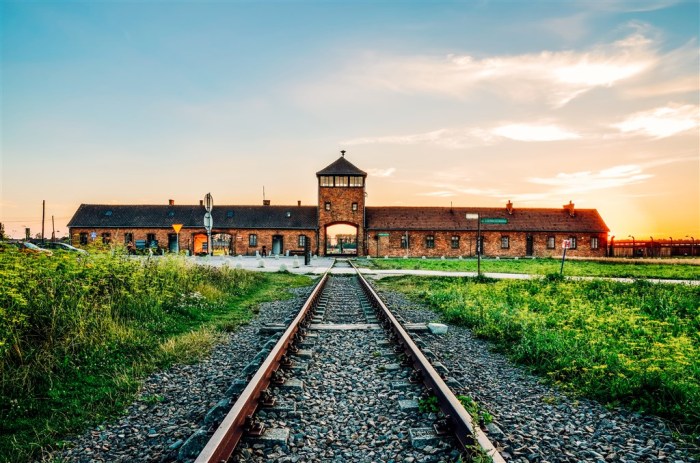Auschwitz tour – Embark on an unforgettable journey to Auschwitz-Birkenau, a former Nazi concentration camp that serves as a poignant reminder of the Holocaust’s horrors and the resilience of the human spirit.
As we delve into the depths of this harrowing history, we’ll explore the ethical considerations of visiting such a site, the various tour options available, and the profound impact it leaves on visitors.
Historical Overview of Auschwitz-Birkenau

Auschwitz-Birkenau, the largest and most notorious Nazi concentration and extermination camp, was established in 1940 in occupied Poland. It became a central hub for the Nazi’s “Final Solution,” the systematic genocide of millions of Jews and other targeted groups during World War II.
Establishment and Role in the Holocaust
Originally established as a prison camp for Polish political prisoners, Auschwitz-Birkenau was gradually expanded into a vast complex of sub-camps and extermination facilities. The camp played a pivotal role in the Holocaust, with an estimated 1.1 million people, primarily Jews, murdered within its walls.
Liberation and Aftermath
On January 27, 1945, Soviet troops liberated Auschwitz-Birkenau, revealing the horrors that had transpired within. The camp’s liberation marked a turning point in the war and served as a testament to the atrocities committed by the Nazi regime. In the years following the war, Auschwitz-Birkenau was preserved as a memorial and museum, serving as a reminder of the Holocaust and a symbol of the horrors that humanity is capable of.
Ethical Considerations of Visiting Auschwitz-Birkenau

Visiting Auschwitz-Birkenau, a former Nazi concentration camp, poses profound ethical considerations. As visitors, we must navigate the delicate balance between honoring the victims, preserving the site’s historical significance, and engaging in responsible tourism.
Respecting the Victims and Preserving History:
- Maintaining a respectful demeanor throughout the visit is paramount. This includes refraining from loud conversations, disrespectful gestures, or any behavior that could detract from the solemn atmosphere.
- Photography is permitted in designated areas only. However, it’s essential to use discretion and avoid taking intrusive or disrespectful photos of victims’ belongings or memorials.
- The site’s historical integrity should be preserved. Do not touch or remove any artifacts or alter the surroundings.
Responsible Tourism and Appropriate Behavior
Auschwitz-Birkenau is not a typical tourist destination. It’s a place of remembrance and reflection, and responsible tourism practices must be followed:
- Book guided tours in advance to ensure a respectful and informative experience.
- Follow the instructions of the guides and security personnel. They are there to ensure the safety and integrity of the site.
- Be mindful of other visitors and allow them to experience the site without interruptions.
- Refrain from consuming food or beverages on the grounds. Designated areas are available for this purpose.
- Be prepared for the emotional impact of the visit. It’s common to experience a range of emotions, and it’s okay to take breaks or seek support if needed.
Types of Tours Available

To explore the Auschwitz-Birkenau complex, visitors can choose from various tour options tailored to their preferences and time constraints.
The following table Artikels the different types of tours available:
| Tour Type | Duration | Cost | Inclusions |
|---|---|---|---|
| Group Tour | Approximately 3.5 hours | Included in admission fee | Guided tour with a professional guide, transportation between Auschwitz I and Birkenau II |
| Private Tour | Flexible, typically 3-4 hours | Varies depending on group size | Exclusive guided tour with a private guide, personalized itinerary, transportation |
| Guided Tour | Approximately 2 hours per site | Included in admission fee | Self-guided tour with an audio guide or mobile app, maps and information boards |
| Self-Guided Tour | Self-paced | Admission fee only | Access to the sites, maps and information boards, audio guide or mobile app rental available |
Planning Your Auschwitz-Birkenau Tour

To ensure a meaningful and respectful visit to Auschwitz-Birkenau, it is essential to plan ahead. Advance booking is highly recommended, as tours tend to sell out quickly, especially during peak season. Consider the type of tour that best suits your interests and time constraints, ranging from guided group tours to private, customized experiences.
Preparing emotionally for the visit is crucial. Auschwitz-Birkenau was a site of unimaginable suffering and horror, and it is important to be aware of the potential emotional impact it may have. Allow yourself time to process the experience and seek support if needed.
Transportation and Accommodation
Auschwitz-Birkenau is located in the town of Oświęcim, Poland. Transportation options from major cities include train, bus, and car rental. Several hotels and guesthouses are available near the camp, offering convenient accommodation for visitors.
Additional Resources
To enhance your understanding of the history of Auschwitz-Birkenau, consider researching reputable sources such as the United States Holocaust Memorial Museum, Yad Vashem, and the Auschwitz-Birkenau State Museum. These resources provide comprehensive information, survivor testimonies, and educational materials to deepen your knowledge and prepare for your visit.
Visitor Experiences and Impact
Visiting Auschwitz-Birkenau can be an emotionally overwhelming and transformative experience. Visitors often report feelings of sadness, anger, and disbelief as they confront the horrors that took place there.
However, many visitors also find the experience to be educational and empowering. They learn about the history of the Holocaust and the importance of fighting against hatred and intolerance. They also gain a new appreciation for the fragility of life and the importance of human dignity.
Visitor Testimonials
- “I was deeply moved by my visit to Auschwitz-Birkenau. It was a difficult experience, but it was also an important one. I learned so much about the Holocaust and the horrors that took place there. I will never forget what I saw, and I will never stop fighting against hatred and intolerance.”
- “Visiting Auschwitz-Birkenau was a life-changing experience for me. It made me realize the importance of human dignity and the fragility of life. I am grateful for the opportunity to have visited this place and to have learned about the Holocaust. I will never forget what I saw, and I will never stop fighting against hatred and intolerance.”
- “I was shocked and horrified by what I saw at Auschwitz-Birkenau. It is impossible to imagine the suffering that took place there. But it is also important to remember what happened so that we can prevent it from happening again. I am grateful for the opportunity to have visited this place and to have learned about the Holocaust. I will never forget what I saw, and I will never stop fighting against hatred and intolerance.”
Emotional Impact
Visiting Auschwitz-Birkenau can be an emotionally overwhelming experience. Visitors often report feelings of sadness, anger, and disbelief. They may also experience feelings of guilt or shame, especially if they are members of the same ethnic or national group as the victims of the Holocaust.
The Auschwitz tour provides a somber reminder of the horrors of the Holocaust. As a UNESCO World Heritage Site, it joins other significant landmarks around the globe that have been recognized for their cultural and historical value. These sites serve as testaments to human history, preserving our collective memory and inspiring future generations.
The Auschwitz tour, in particular, offers a poignant opportunity to reflect on the atrocities of the past and to recommit ourselves to fostering peace and understanding.
Educational Impact, Auschwitz tour
Visiting Auschwitz-Birkenau can be a powerful educational experience. Visitors learn about the history of the Holocaust and the Nazi regime. They also learn about the importance of fighting against hatred and intolerance.
Transformative Impact
Visiting Auschwitz-Birkenau can be a transformative experience. Visitors often report that they have a new appreciation for the fragility of life and the importance of human dignity. They may also be inspired to become more active in fighting against hatred and intolerance.
Controversies and Criticisms
Auschwitz-Birkenau tours have sparked controversies and criticisms, raising questions about the commercialization and exploitation of a site of immense historical significance and human suffering.
Some argue that charging admission fees for tours can be seen as profiting from a tragedy, while others believe that it is necessary to cover the costs of maintaining and preserving the site.
Concerns about Commercialization
- Critics argue that Auschwitz-Birkenau should not be treated as a tourist attraction but rather as a solemn memorial.
- They express concerns that the presence of tourists and commercial activities can detract from the site’s historical significance and emotional impact.
Perspectives on the Value of Tourism
- Proponents of Auschwitz-Birkenau tours argue that they serve an educational purpose by raising awareness about the Holocaust and its horrors.
- They believe that visiting the site firsthand can have a profound impact on visitors, fostering empathy and understanding.
Efforts to Address Criticisms
In response to these criticisms, efforts have been made to ensure the respectful preservation of Auschwitz-Birkenau and to minimize the impact of tourism on the site.
The horrors of Auschwitz can be difficult to process, but it’s an important reminder of the atrocities that humans are capable of. After your visit, you may need some time to relax and decompress. Why not head to one of the best beaches in the Caribbean ?
The crystal-clear waters and white-sand beaches will help you forget the horrors of the past and focus on the beauty of the present.
- Visitor numbers are strictly limited, and tours are conducted in a sensitive and educational manner.
- The site is maintained with the utmost care, and any profits generated from tours are reinvested into its preservation and educational programs.
Educational Value of Auschwitz-Birkenau Tours: Auschwitz Tour

Visiting Auschwitz-Birkenau provides an invaluable educational experience that fosters historical understanding, promotes empathy, and combats Holocaust denial.
Historical Understanding
Tours of Auschwitz-Birkenau offer an immersive and firsthand encounter with the remnants of the Nazi concentration and extermination camp complex. Visitors witness the preserved barracks, gas chambers, and crematoria, gaining a deeper understanding of the horrors that transpired there.
The Auschwitz tour is an important historical experience that should be included in any travel itinerary to Poland. The tour provides a sobering insight into the horrors of the Holocaust and the importance of remembering the victims. To plan your Auschwitz tour and ensure you have a budget-friendly trip, be sure to use a travel budget calculator.
This tool can help you estimate the costs of your trip, including transportation, accommodation, and food, so you can make informed decisions about your travel plans and focus on the historical significance of the Auschwitz tour.
Empathy and Remembrance
Through guided tours, visitors hear the personal stories of victims and survivors, allowing them to connect on a human level with the experiences of those who suffered. This fosters empathy, compassion, and a sense of responsibility to remember the Holocaust and its victims.
Combating Holocaust Denial
Tours of Auschwitz-Birkenau play a crucial role in combating Holocaust denial and historical revisionism. By providing irrefutable evidence of the atrocities committed, they challenge those who seek to distort or deny the Holocaust.
Educational Programs and Initiatives
Auschwitz-Birkenau also offers educational programs and initiatives that enhance the learning experience for visitors. These include:
- Guided tours for students and educators
- Workshops and seminars on Holocaust history and remembrance
- Online resources and materials for further study
Final Wrap-Up
Visiting Auschwitz-Birkenau is not merely a historical excursion; it’s a transformative experience that challenges our perspectives, deepens our empathy, and reinforces the importance of preserving memory and fighting against intolerance.
As we emerge from the shadows of the past, we carry with us a renewed appreciation for the fragility of human rights and a profound sense of responsibility to ensure that such atrocities never occur again.
FAQ
What is the best way to book an Auschwitz-Birkenau tour?
It’s highly recommended to book your tour in advance, especially during peak season, to secure your spot and avoid disappointment.
What should I wear and bring to the tour?
Dress respectfully, as you’re visiting a site of great historical significance. Comfortable walking shoes are essential, and a camera is recommended to capture the poignant moments.
Is it possible to visit Auschwitz-Birkenau independently?
Yes, self-guided tours are available, but guided tours with knowledgeable experts provide a more comprehensive and insightful experience.